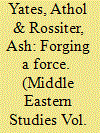| Srl | Item |
| 1 |
ID:
192159


|
|
|
|
|
| Summary/Abstract |
Interest and anxiety about China’s economic statecraft, or the ways in which it uses economic means to achieve foreign policy, is booming. The overriding perception is that China has sophisticated, long-term plans to enhance its power on the global stage through the use of economic strategies and tools and that it is uniquely capable of effectively implementing those plans now or in the future. Yet when it comes to actual outcomes, whether or not China has been able to achieve its foreign policy goals via economic means, the evidence is mixed at best. This article seeks to move beyond some of the shortcomings in our understanding of Chinese economic statecraft by exploring the links between perceptions, ambitions, abilities, and outcomes of Chinese foreign economic policies and behaviour. We propose an alternative to the concept of economic statecraft by introducing instead five different ‘modes of economic influence’. We suggest directions for future research focused on China’s economic influence, including its latent structural power.
|
|
|
|
|
|
|
|
|
|
|
|
|
|
|
|
| 2 |
ID:
177279


|
|
|
|
|
| Summary/Abstract |
It has long been observed that the development of professional security institutions is a key stage in modern state formation. Leaders of many proto-states embarking on programs of rapid development – such as many of the rulers of the Arab Gulf States in the 1960s – have brought in foreign professional expertise to assist in building up fledgling state institutions, including militaries, police forces and intelligence services. We know little, however, about the relationship between ruler and these key expatriates performing these functions. To help fill this lacuna, this article examines the first three expatriate professional heads of Abu Dhabi Police over the period 1959-68 and their relationship with their paymasters – first Shaikh Shakhbut bin Sultan Al Nahyan, then his brother, Shaikh Zayed. It details the difficulties these professional expatriates faced in operating within this ruler-dominated political-administration system. We believe observations made in this study have relevance to the contemporary Gulf, where governments continue to employ highly skilled expatriates in their security institutions and much else besides.
|
|
|
|
|
|
|
|
|
|
|
|
|
|
|
|